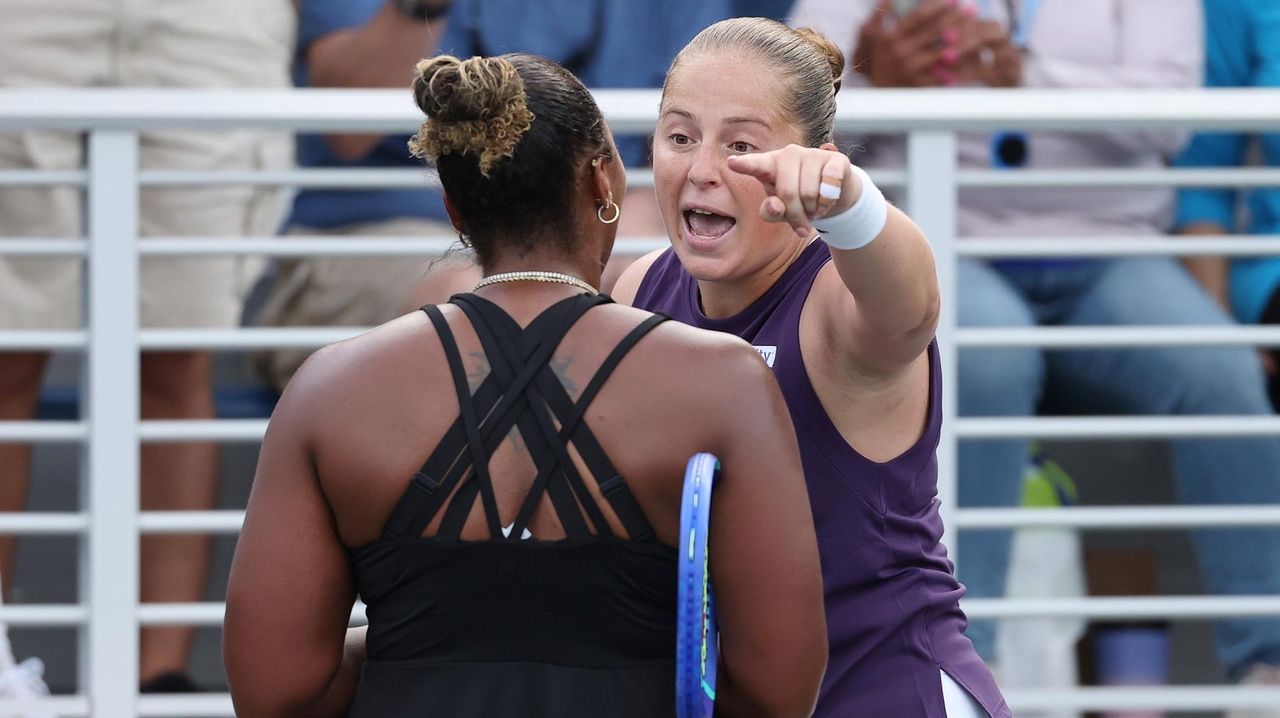Apparently, there are multiple levels of byzantine rules that tennis players are expected to follow.
There are the clear-cut rules of competition, established regulations that govern how the game is scored and played. There is an extensive code of conduct in the USTA Handbook — no. 37 covers grunting on the court — which governs sportsmanship and fair play.
And then, according to Jelena Ostapenko, there are some additional unwritten rules of etiquette, ones so important and steeped in tradition that anyone who violates them clearly deserves to be both insulted and disrespected.
The 25th-seeded Latvian used that unwritten set of rules as justification for her abhorrent behavior after losing an ugly second round match to unseeded Taylor Townsend, 7-5, 6-1, Wednesday.
Ostapenko was upset that the 29-year-old American did not follow some unwritten custom and lift her hand in apology after a shot clipped the top of the net but remained in play in the first set of their match. So upset that she attempted to ruin what was arguably the biggest win of Townsend’s career. Already known for her frosty, drive-by handshakes, Ostapenko ignited a heated conversation when the two met at the end of the match. The exchange was captured on multiple outlets and was addressed by ESPN on the court immediately after the match.
“It’s competition, people get upset when they lose,” Townsend said. “Some people say bad things. She told me I have no class, no education and to see what happens when we get outside the U.S.”
No class. No education. Those are some nasty words, and they looked even nastier coming out of a white player’s mouth as she waved her finger in the face of a Black player.
Ostapenko, who left the USTA facility right after the loss, posted less than an hour later that she had been upset by both the net shot and the fact that Townsend had started her warmup at the net instead of the baseline, which apparently is also a violation of some unwritten rule. Then, after her social media was filled with allegations of racism, Ostapenko denied those claims after a series of now-expired Instagram posts.
Townsend declined after the match to speculate on whether her opponent’s motivations were racist. Twenty-four hours later, however, the match and its aftermath were still the talk of the tournament, having made the jump from the sports sites to People magazine.
Two-time U.S. Open champion Naomi Osaka, who is Black and Asian, was asked after her second-round win over Hailey Baptiste Thursday how she felt to hear Ostapenko criticize a Black player by using those kinds of words.
“It’s obviously one of the worst things you can say to a Black tennis player in a majority white sport,” Osaka said. “And granted, I know Taylor and I know how hard she’s worked and I know how smart she is so she’s the furthest thing from uneducated or anything like that.
“But if you’re genuinely asking me about the history of Ostapenko, I don’t think that’s the craziest thing she’s said. I’m going to be honest. I think it’s ill timing and the worst person you could have ever said it to. And I don’t know if she knows the history of it in America. But I know she’s never going to say that ever again in her life. But, yeah, I mean, it was just terrible. Like, that’s just really bad.”
The question is whether it will be more than a learning moment for Ostapenko, who is known for her confrontational behavior and outbursts on the court. At Wimbledon in 2022, she received a $10,000 fine for knocking over a chair and water bottle after losing to Tatjana Maria. In 2024 in Brisbane International she screamed “You are blind” at an umpire during a quarterfinal loss to Victoria Azarenka.
In other words, Ostapenko really doesn’t seem like the logical candidate for a job with the tennis etiquette police. And, whether or not her opponent broke some unwritten rule, it’s pretty apparent that this time she has broken a written one.
The Grand Slam rulebook, which is the one that governs the U.S. Open, prohibits verbal abuse “at any time” toward an opponent or others within the tournament precincts. The rule also authorizes a fine of up to $50,000. The U.S. Open recently fined Daniil Medvedev $42,500 for racket abuse and unsportsmanlike conduct for his meltdown earlier this week after a photographer walked onto the court. A spokesman for the USTA said Thursday “no fine has been assessed” for Ostapenko’s actions.
Tennis has made great strides to be more inclusive over the past decade, and the result is that a number of top players, both men and women, are people of color. Whether or not Ostapenko understood the history of this country and how hurtful her words were to some, the USTA needs to think long and hard about whether they should do something to make sure she knows.
Barbara Barker is an award-winning columnist and features writer in the sports department at Newsday. She has covered sports in New York for more than 20 years.
